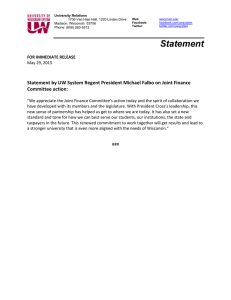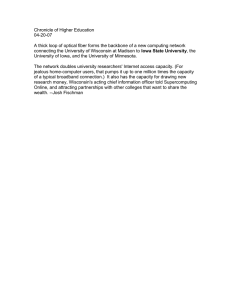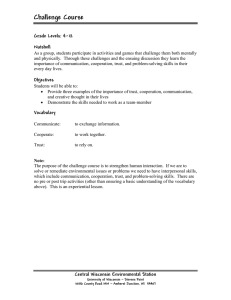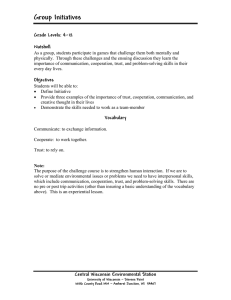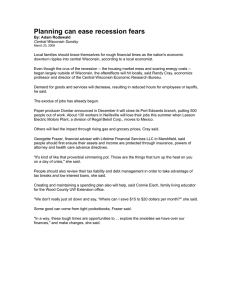Wisconsin Open Meetings Law for Department Promotion Meetings
advertisement
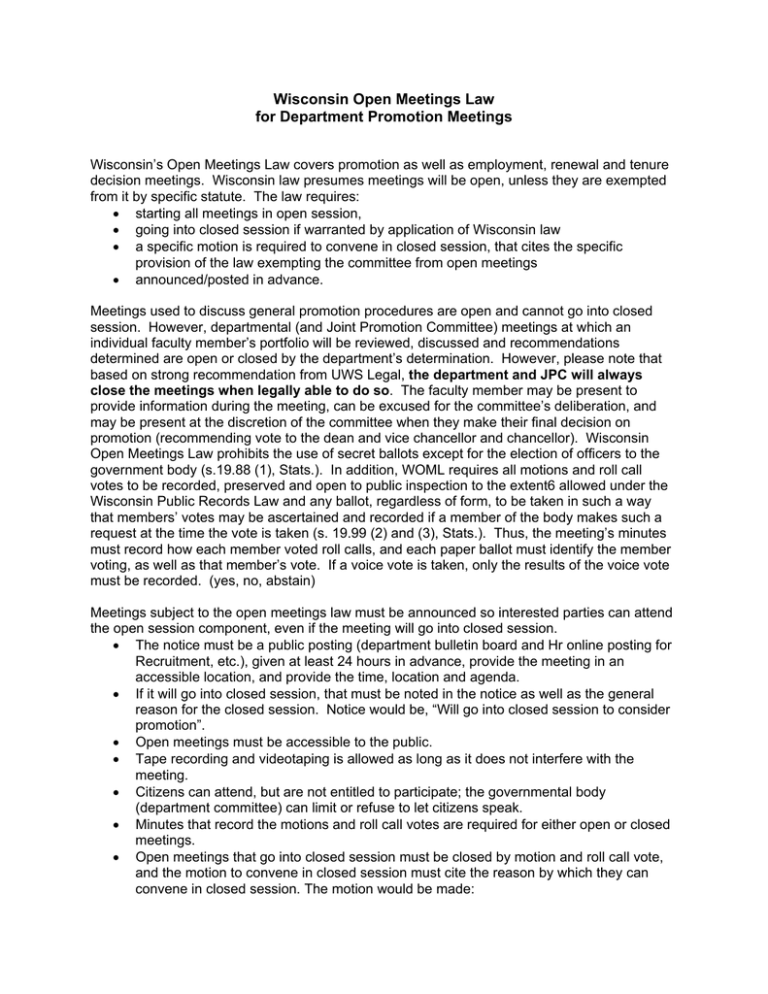
Wisconsin Open Meetings Law for Department Promotion Meetings Wisconsin’s Open Meetings Law covers promotion as well as employment, renewal and tenure decision meetings. Wisconsin law presumes meetings will be open, unless they are exempted from it by specific statute. The law requires: • starting all meetings in open session, • going into closed session if warranted by application of Wisconsin law • a specific motion is required to convene in closed session, that cites the specific provision of the law exempting the committee from open meetings • announced/posted in advance. Meetings used to discuss general promotion procedures are open and cannot go into closed session. However, departmental (and Joint Promotion Committee) meetings at which an individual faculty member’s portfolio will be reviewed, discussed and recommendations determined are open or closed by the department’s determination. However, please note that based on strong recommendation from UWS Legal, the department and JPC will always close the meetings when legally able to do so. The faculty member may be present to provide information during the meeting, can be excused for the committee’s deliberation, and may be present at the discretion of the committee when they make their final decision on promotion (recommending vote to the dean and vice chancellor and chancellor). Wisconsin Open Meetings Law prohibits the use of secret ballots except for the election of officers to the government body (s.19.88 (1), Stats.). In addition, WOML requires all motions and roll call votes to be recorded, preserved and open to public inspection to the extent6 allowed under the Wisconsin Public Records Law and any ballot, regardless of form, to be taken in such a way that members’ votes may be ascertained and recorded if a member of the body makes such a request at the time the vote is taken (s. 19.99 (2) and (3), Stats.). Thus, the meeting’s minutes must record how each member voted roll calls, and each paper ballot must identify the member voting, as well as that member’s vote. If a voice vote is taken, only the results of the voice vote must be recorded. (yes, no, abstain) Meetings subject to the open meetings law must be announced so interested parties can attend the open session component, even if the meeting will go into closed session. • The notice must be a public posting (department bulletin board and Hr online posting for Recruitment, etc.), given at least 24 hours in advance, provide the meeting in an accessible location, and provide the time, location and agenda. • If it will go into closed session, that must be noted in the notice as well as the general reason for the closed session. Notice would be, “Will go into closed session to consider promotion”. • Open meetings must be accessible to the public. • Tape recording and videotaping is allowed as long as it does not interfere with the meeting. • Citizens can attend, but are not entitled to participate; the governmental body (department committee) can limit or refuse to let citizens speak. • Minutes that record the motions and roll call votes are required for either open or closed meetings. • Open meetings that go into closed session must be closed by motion and roll call vote, and the motion to convene in closed session must cite the reason by which they can convene in closed session. The motion would be made: ** “I move to convene in closed session to consider promotion of [faculty member’s name(s)] in the department of [your department] as provided in section 19.85(1) (c) of Wisconsin statutes.” The motion must be seconded and voted upon by roll call vote, recorded in the minutes so that each member’s vote is shown. The meeting cannot go from closed to open unless the notice of the meeting states it will do so. o • • Penalties for not complying with the law: • Are enforced by the Wisconsin Attorney General and district attorney’s have the authority to enforce the open meetings law. • Citizens can complete and notarize a complaint form to report infractions. • Any member of the governmental body (here we are talking about the faculty review committee) who knowingly attends a meeting held in violation of open meetings law is subject to penalties between $25-$300 for each violation and actual and necessary costs of prosecution including reasonable attorney fees. • A committee member may not be reimbursed by the governmental body (UW-L) for penalties from a violation. • Other awards may be made by the court, including voiding action taken by the governmental body. Link to Open Records Section 19.85 of Wisconsin Statutes: http://folio.legis.state.wi.us/cgibin/om_isapi.dll?clientID=79339$infobase=stats.nfo&jump=ch.%2 019 Link to University 9of Wisconsin System General Counsel site regarding Wisconsin’s Open Meetings Law: http://www.uwsa.edu/gc-off/deskbook/wom1.htm ** For more specific information on closed session exemptions see: http://nxt.legis.state.wi.us/nxt/gateway.dll?f=templates&fn=default.htm&d=stats&jd=19.85

